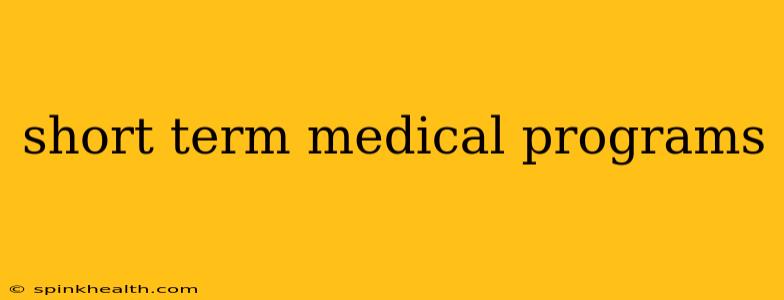The world of healthcare is constantly evolving, and with it, the demand for skilled medical professionals is booming. But what if you're eager to launch a career in healthcare quickly? What if you don't have the time or resources to commit to a four-year degree? The answer lies in the exciting realm of short-term medical programs. These programs offer a streamlined path to rewarding careers, equipping you with the skills and knowledge needed to make a real difference in people's lives, all within a shorter timeframe. Let's dive into the possibilities.
What are Short-Term Medical Programs?
Short-term medical programs encompass a wide range of options, typically lasting anywhere from a few weeks to a year. Unlike traditional, lengthy degree programs, these courses focus on specific skills and certifications within the healthcare industry. They're perfect for individuals seeking a quick entry into the field, career changers looking for a fast transition, or those wanting to add specialized skills to their existing qualifications.
Think of it like this: instead of building an entire house, you're focusing on building a strong, functional addition – a crucial part of the overall structure. This allows you to quickly contribute your skills and make a difference while potentially pursuing further education down the line.
What Types of Short-Term Medical Programs are Available?
The variety of short-term medical programs is astonishingly diverse! Here are a few examples:
-
Certified Nursing Assistant (CNA): This is one of the most popular short-term programs, typically lasting several weeks. CNAs provide basic care to patients in hospitals, nursing homes, and assisted living facilities. It's a fantastic stepping stone to further nursing education or a rewarding career in its own right.
-
Medical Assistant (MA): MA programs usually last around a year and prepare graduates to assist physicians in various medical settings. Their responsibilities range from taking patient vitals to assisting with minor procedures.
-
Phlebotomy Technician: A short-term program focused on drawing blood samples from patients. Phlebotomists work in hospitals, clinics, and blood banks, playing a vital role in patient diagnostics.
-
Emergency Medical Technician (EMT): EMT programs train individuals to provide emergency medical care in pre-hospital settings. This is a demanding but highly rewarding career path that requires both classroom learning and extensive hands-on training.
What are the Benefits of Short-Term Medical Programs?
The benefits of choosing a short-term medical program extend beyond the accelerated timeframe. Here are some key advantages:
-
Faster Career Entry: As the name suggests, these programs get you into the workforce faster than traditional degree programs.
-
Lower Costs: Short-term programs generally involve lower tuition fees and fewer overall educational expenses.
-
Focused Skill Development: They concentrate on specific skills, making you a job-ready candidate immediately after graduation.
-
Flexibility: Many short-term programs offer flexible schedules to accommodate working professionals or students with other commitments.
-
Career Advancement Opportunities: While some are standalone careers, many programs serve as a stepping stone to further education and higher-paying roles.
How Do I Choose the Right Short-Term Medical Program?
Selecting the right program is crucial. Consider these factors:
-
Your Interests and Career Goals: What specific area of healthcare excites you? What kind of work environment do you thrive in?
-
Program Accreditation and Reputation: Ensure the program is accredited by a reputable organization.
-
Curriculum and Hands-on Training: Look for programs with a well-structured curriculum and sufficient hands-on training opportunities.
-
Job Placement Assistance: Many reputable programs offer career services to help graduates find employment.
-
Cost and Financing Options: Explore the program's tuition fees and available financial aid options.
What are the Job Prospects After Completing a Short-Term Medical Program?
Job prospects after completing a short-term medical program are generally excellent. The demand for skilled healthcare professionals is consistently high, meaning graduates often find employment quickly. The specific job market will, of course, depend on your chosen specialty and location.
Are Short-Term Medical Programs Right for Me?
This question depends entirely on your individual circumstances, aspirations, and learning style. If you desire a quick entry into the healthcare field, possess a strong work ethic, and are focused on acquiring specific skills, a short-term medical program might be the ideal pathway for you. It's a stepping stone, a quick start, a chance to jump into a world that needs your skills.
This fast-paced world needs quick thinkers and adaptable hands. Short-term medical programs are your gateway to a rewarding career in the healthcare industry. The journey to making a difference starts now.

